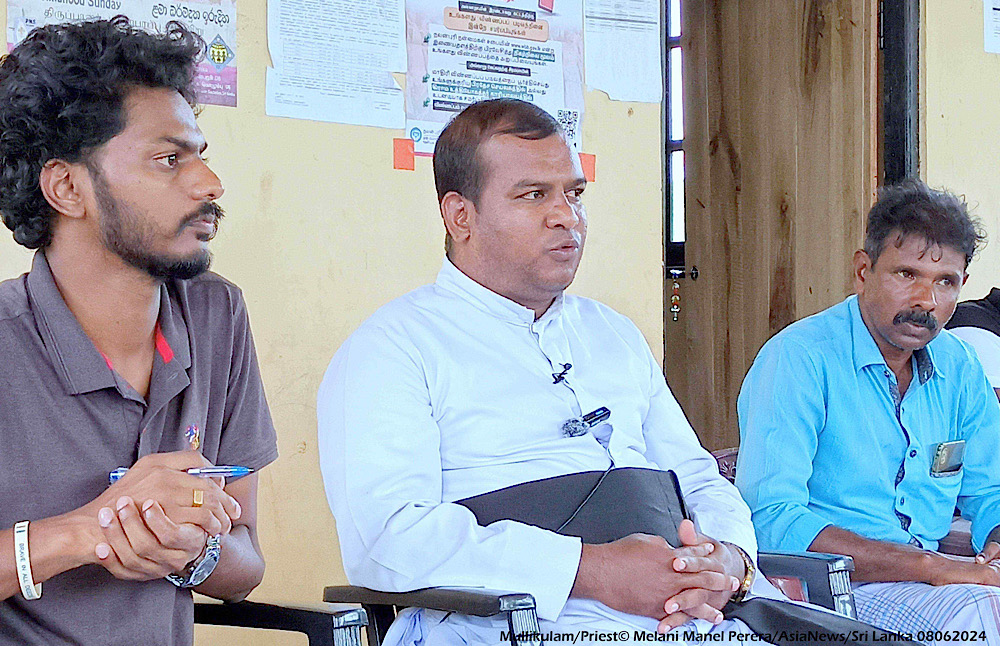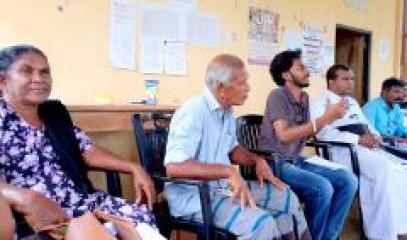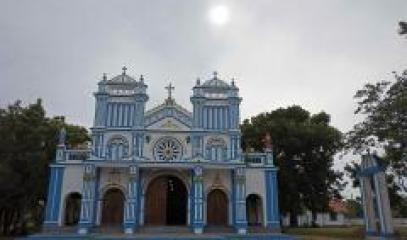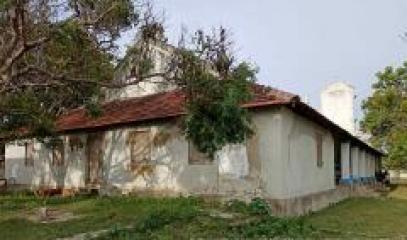Mannar: priest in the forefront of the fight for land restitution
A group of activists and journalists met with Fr Bastian Rocknadan, who is fighting for the return of Catholics to the village of Mullikulam. The dispute flared up in 1990, when the Navy took possession of the area, forcing the inhabitants to move. Fifteen years after the end of the war, the issue remains unresolved.
Mannar (AsiaNews) - "We have been talking and talking about it for many years, attending meetings, meeting and following some people and begging them to give us back our land. Do something for our people. On behalf of our people, ask the United Nations for help. Many lands have already been returned, but ours is still in their hands'. This is Fr Bastian Rocknadan, a Sri Lankan priest, who tells AsiaNews of his great concern for his parishioners and their fate for years suspended in uncertainty and precariousness.
P. Rocknadan is a priest at Our Lady's Church in Mullikulam, in the diocese of Mannar. In recent days, the priest met with a group of activists and journalists from the south, led by the Law and Society Trust (Lst) to talk about the long-standing issue of displaced people's land in the northern province. The delegation has been expressing interest and concern over the issue of IDPs' land in the North for some time and visited the Mullikulam IDP community expressing concern and dismay.
The Tamil Catholics, in fact, consider the village an integral part of the Catholic and Tamil community, as well as being part of an area rich in land, facing the sea and with vast rice cultivations, bordering the Puttalama and Wilpattu National Park in Mannar district. The area is home to 217 families who have lived a prosperous life earning from the land, mud and open sea fishing.
The dispute for the Tamil families began in 1990, when the Navy took possession of their land. "We were forced to leave our village for the first time because of the civil war," said Mariadasan Revel, a village elder. In 2002, with the signing of a peace agreement brokered by Norway, the local population started to return to their home villages. However, in 2007, when fighting flared up again, the people found themselves without anything or resources to live on, displaced in the jungle and in constant danger from elephants and snakes.
In 2012, the villagers tried again to get their village back, but once again failed in their efforts. In mid-June 2012, however, the families were helped by the late Bishop Rayappu Joseph and others who had taken up their cause in Colombo and Negombo, to build huts and temporary housing with the help of branches, coconut leaves and other foliage and branches. At the end of June that year, about 100 families arrived in the jungle of Marichchikattu without considering any risks and started to fight for their homeland. In 2012, Card. Malcolm Ranjith, Archbishop of Colombo, had reached an agreement with Gotabhaya Rajapaksa, then Minister of Defence, and some progress was made. Nevertheless, the response from the authorities was very clear: 'You cannot return to your homes'. Gotabhaya later promoted the construction of the naval base in the village, while building 26 houses for the residents in the jungle area as compensation.
'Fifteen years have passed since the end of the war, but we are not allowed,' emphasises Fr Bastian Rocknadan, 'to enjoy this freedom. We do not have this freedom. I say this because you have come here, especially from the southern province'. "We are happy about your attention to our problem," continued the priest, towards which "we have tried many times over the years, but we have not obtained the solution we need". Turning to the journalists and activists from Colombo who met him, Fr Bastian asks them to raise their voices. 'Give us back the village of Mullikulam,' asks the priest, who says he is convinced that 'the government will return the land that was expropriated' unduly in the past.
Continuing his testimony, Fr Bastian reports that the inhabitants of this village are now scattered in four directions. About 40 families live in India, another 140 families live in Kayakkuli and another 50 families live in Mannar. The hope and demand of all these people is to get their village back and to start their lives there again. "In short, we want nothing more: give us back our village. We can rise again,' adds an elderly couple from the village of Mullikulam, who only ask to be able to 'finish' their lives in the 'village where we were born'.
It has been 15 years since the end of the civil war in Sri Lanka, the anniversary of which falls in May 2024. For many years, the main demand of the people in the north and east, as well as politicians, has been to release the homes and land of the inhabitants, which had been taken over by the army for security reasons during the war, to be returned to the original residents. Consideration of this legitimate request has been extremely slow, and local and international interventions and pressure for a satisfactory solution have been to no avail. In the last few days, a breakthrough seems to be on the horizon, with a sudden - albeit slow and delayed - awakening of the issue that has returned to the forefront.
Thus, the village of Mullikulam, transformed over time into a naval base, is also asking to be returned to its owners. Since 2009, 73016.50 acres of land in the Northern Province and 12236.69 acres of land in the Eastern Province have been used for the creation of army camps, a military source in charge of media relations revealed. At the moment, 63187.91 acres of land in the North that were in the army's possession have been cleared, while another 9828.67 acres are still under the control of the military and waiting to be cleared.










.png)










